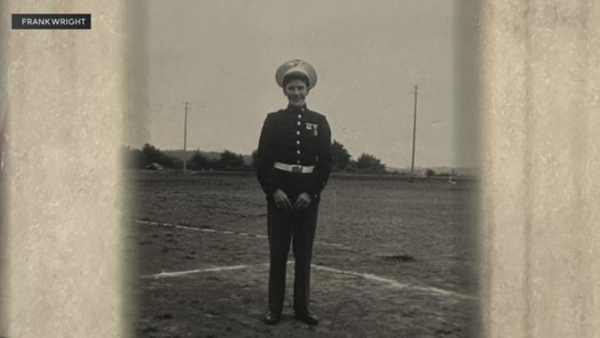
Residing in Lodi, California, Frank S. Wright, is one of the few surviving WWII Marine Raiders. He proudly affiliates himself with the Stockton Marine Corps Club and the American Legion Karl Ross Post 16.
His entry into the military began in 1942, amid the chaos of World War II, when he decided to enlist rather than finish high school. Wright attributes his selection of the Marine Corps to their uniform, a sentiment shared by many in his generation.
Like countless others, Wright’s determination to serve was catalyzed by the fateful bombing of Pearl Harbor on December 7, 1941. Just a month after this event, driven by a sense of duty, the then-16-year-old Arkadelphia, Arkansas native offered his allegiance to his country. Wright recalled the words of President Franklin D. Roosevelt, rallying the nation to arms against the Japanese. Inspired, he embarked on his journey to enlistment, only to encounter initial rejection owing to his age and slight frame.
Determined, he improvised by stashing bananas in his pockets to meet the enlistment criteria. Thus began his journey in the Marine Corps, marked by rigorous training in San Diego before his deployment to Astoria, Oregon. Assigned to guard duty, Wright’s aspirations for frontline action were later fulfilled when he volunteered for the 4th Marine Raiders, a decision that led him under the command of President Roosevelt’s son, James Roosevelt.
With a small group of comrades, Wright embarked on a mission to reclaim the Solomon Islands. Tasked with securing strategic positions and repelling Japanese advances, he and his comrades confronted the harsh realities of jungle warfare. Amidst the perils of combat, Wright was tested when he contracted malaria, a setback that threatened to sideline him. He defied orders to remain in a field hospital, determined not to be separated from his brothers-in-arms.
His valor was tested further during the Battle of Guam, where he sustained severe wounds but continued to fight for the liberation of the island. Despite the grim realities of war, Wright fondly recalled a lighthearted moment when he and fellow soldiers stumbled upon untouched cases of sake. Unable to take it with them, Wright and his comrades buried the cases. (Upon returning, Wright discovered that a base post office had been built on top of their buried treasure.) Wright and his comrades pressed on, ultimately landing on Iwo Jima, where he witnessed the iconic raising of the American flag on Mount Suribachi.
Following the war’s end, Wright continued to serve as a Marine Drill Instructor before his honorable discharge in 1946. Post-war, Wright transitioned into civilian life. Over the years, he has been awarded numerous military honors, including a Navy Unit Commendation, the Presidential Unit Citation with two stars, a Purple Heart with two stars, the American Campaign Medal, the Asiatic-Pacific Campaign with three service stars, the Fleet Marine Force with four stars, the Marine Corps Expedition Medal, a Combat Action Ribbon with four stars, the Victory Medal, and a Good Conduct Medal. In recognition of his service, Wright was honored as the San Francisco 49ers’ “Frontline Hero of the Game” at the NFC Championship Game, fulfilling a lifelong dream of attending a live game.
Despite his struggles with PTSD, he eventually found solace in writing about his experiences in his book, “Battles in the Pacific: World War II, My Personal War Causing PTSD.” Today, at the age of 98, he continues to inspire others through his lived experiences of unwavering commitment to duty and honor.